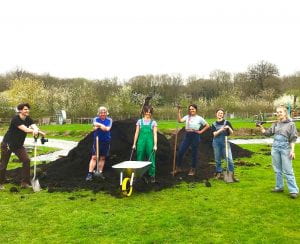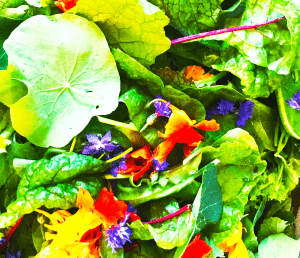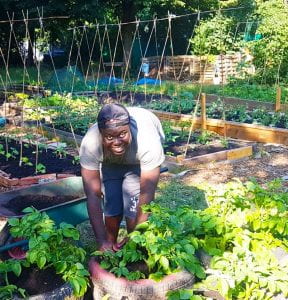Have you ever grown your own tomato or garnished a drink with mint from your windowsill? Chloë Dunnett (Food Policy, 2019) and her team, know how great locally grown food can be, both for the planet and the consumer, and have ambitious plans for the new Sitopia Farm, in the middle of London’s Greenwich.
 Growing vegetables in the middle of London might seem odd, but that’s what City alumna Chloë Dunnett is doing. With her new urban farm in Greenwich, Sitopia Farm, she’s hoping to help change how we understand and benefit from our food.
Growing vegetables in the middle of London might seem odd, but that’s what City alumna Chloë Dunnett is doing. With her new urban farm in Greenwich, Sitopia Farm, she’s hoping to help change how we understand and benefit from our food.
“The macro picture is the food system, it’s broken,” Chloë says, explaining that the current food system is responsible for 20 to 30 percent of greenhouse gas emissions and is a major contributor to mass extinctions and biodiversity loss. And while circa 690 million people worldwide go hungry every year, nearly 2 billion are obese, and many of those working to provide our food are underpaid and labour under very poor conditions. These are all reasons why food grown on local and sustainable farms, actively supported by the local community, are important.
“I wanted to do something practical to actually be the change we want to see,” Chloë says, aware that the farm is only a drop in the ocean. “It’s partly about demonstrating what can be done but also encouraging wider change. I think that’s part of the advantage of being able to grow in the middle of the city.”
 The farm is starting out with a 2-acre plot on the already existing Woodlands Farm, and there are plans to grow the space with time. The farm will use regenerative organic farming methods to grow vegetables, herbs, and flowers, and the aim is to connect with the local community, both as a sustainable food provider and a place to learn about food and enjoy each other’s company.
The farm is starting out with a 2-acre plot on the already existing Woodlands Farm, and there are plans to grow the space with time. The farm will use regenerative organic farming methods to grow vegetables, herbs, and flowers, and the aim is to connect with the local community, both as a sustainable food provider and a place to learn about food and enjoy each other’s company.
“We’re planning a whole host of activities to get people involved … We want to have harvest dinners and feasts in the field. We’re going to have open days and events like “help down the farm” and people speaking,” Chloë says. “We’ve also had lots of meetings with different people in Greenwich. The Public Health team is really focused on food poverty and obesity issues, and the possibility of food growing and initiatives like this to help tackle that.”
 The word Sitopia was coined by a member of Sitopia Farm’s impressive board, author and architect Carolyn Steel, who published her book Sitopia – How Food Can Save the World last year. According to Chloë, it means “the foodplace” and comes from the Greek sitos, meaning food, and topos, meaning place. She explains Carolyn Steel’s view that we live in a world shaped by food, but it’s too big for us to see it. It’s one of the biggest employers and it has a huge impact on our health and our wellbeing, and the environment.
The word Sitopia was coined by a member of Sitopia Farm’s impressive board, author and architect Carolyn Steel, who published her book Sitopia – How Food Can Save the World last year. According to Chloë, it means “the foodplace” and comes from the Greek sitos, meaning food, and topos, meaning place. She explains Carolyn Steel’s view that we live in a world shaped by food, but it’s too big for us to see it. It’s one of the biggest employers and it has a huge impact on our health and our wellbeing, and the environment.
“On the one hand it’s a source of lots of problems, but it’s also the solution. It’s a joyful thing, you know, breaking bread with people. It’s one of the most basic things, putting your hands in the soil. There’s something very primal about that.”
 Although work has already begun on the farm, Chloë and her team are still crowdfunding to make sure they can create the structure they need to become a well-run, financially viable farm that caters to the majority.
Although work has already begun on the farm, Chloë and her team are still crowdfunding to make sure they can create the structure they need to become a well-run, financially viable farm that caters to the majority.
“We do need to be more accessible. We don’t want to be selling bags of tomatoes for 6 quid at Borough Market, but then it’s hard to sell vegetables and make a living from it as well, that’s the reality of it,” Chloë says. “There’s this myth of cheap food when of course there is no such thing. The cost is being picked up somewhere else in the system, whether that’s a health cost or environmental cost. But it is very important to us, accessibility, so we’re exploring different ways to do it. On the one hand, we want to be selling to local restaurants and at markets at a decent price, and have a diverse source of income, not just vegetables and salad, but flowers for example as well. But we’re also looking into selling it to the local public sector, to schools and hospitals, as a way of ensuring more people have good food.”
Chloë has always been interested in growing her own food and has worked on farms around the world, but she started her career in an international development charity in Tanzania and then rose to the position of senior civil servant working on central government policy development and implementation, before deciding to study Food Policy at the School of Health at City.
“What really appealed to me about the course was looking at the whole system from production to consumption, and from a health, economics, and social and environmental perspective. It fulfilled everything I’d hoped for and more. I learned so much and made amazing contacts and friends. At the same time, I got an urban food growing traineeship, so I got to do the practical stuff as well as the much bigger theoretical concepts.”
 Not everything has been familiar territory though when starting work on the farm and setting up the crowdfunding during a global pandemic.
Not everything has been familiar territory though when starting work on the farm and setting up the crowdfunding during a global pandemic.
“Things like putting together a video. It’s not my skill set. I’ve done a lot before but filming a video and getting everyone together during Covid, and social distancing, and editing …” Chloë laughs at the hectic schedule she’s worked with ever since they found out about their new space on Woodlands Farm. She’s quick to mention the generosity people have shown, donating their skills, time, and money to make sure the project is a success.
“It has really brought together lots of people who have helped us in different ways, which has all been challenging but brilliant.”
Although hundreds of thousands of people have easy access to Greenwich and it’s therefore an excellent place for a community farm, not all of us can visit. That doesn’t mean we can’t try our hands at urban farming.
“Just do it! Once you’ve tasted it, something you’ve grown yourself, there’s no going back!” Chloë says. “I live in a flat here and grow things on window ledges, and it’s amazing how much you can grow in a small space. Grow a few herbs, whatever herbs you like to cook with. Mint is really easy to grow. Put it in a drink, soft or alcoholic, whatever your choice is, and a homegrown tomato is like nothing else.”
And what are her tips for getting outside even when the weather is bad?
“I think, nature doesn’t stop just because it’s cold. The plants don’t have days off just because it’s raining, they need you. And you need them. And that relationship is really what I love about it. You do feel a bit connected to the earth and the seasons, and the weather. And you notice things in a different way by doing it. That and lots of cups of tea and coffee, and some really good socks and jumpers and hats.”
Thank you to Chloë for sharing her love of urban farming!
If you would like to learn more, you can visit the Sitopia Farm website or their Spacehive crowdfunding page
*UPDATE MAY 2021: Sitopia Farm reached their crowdfunding goal and the work is underway.
